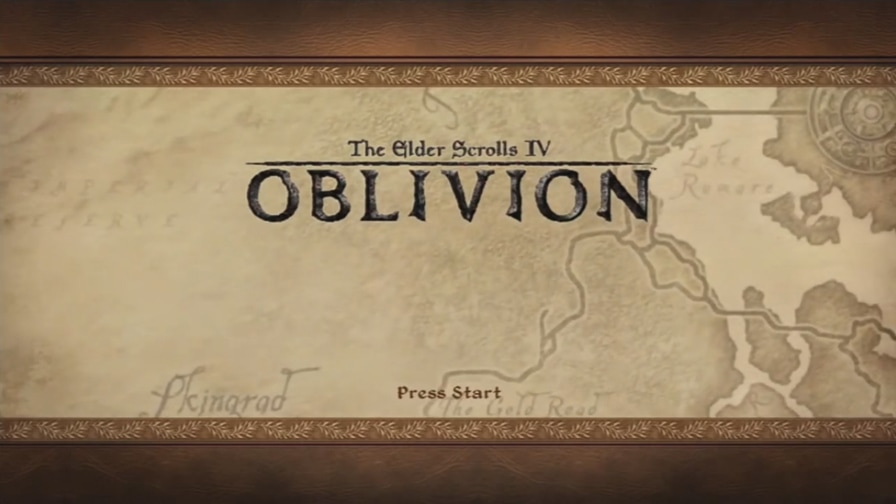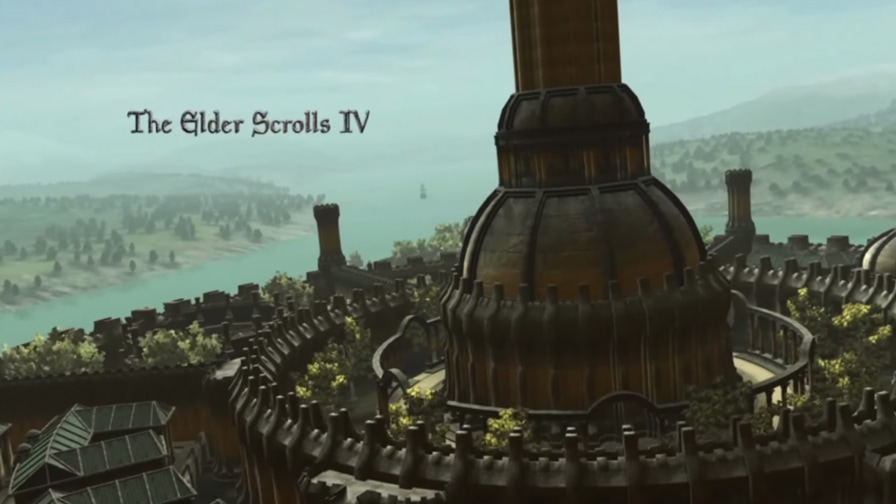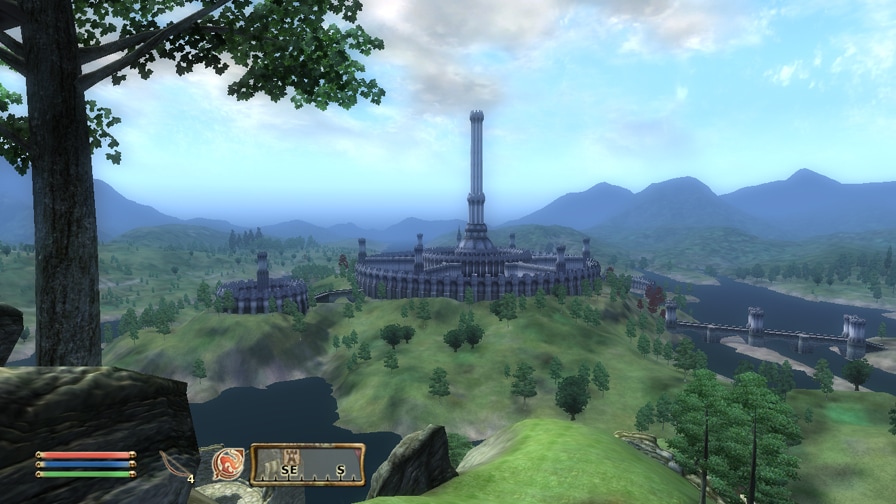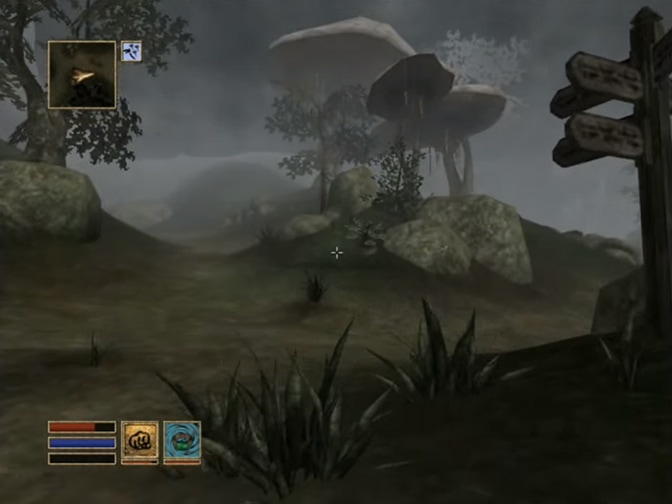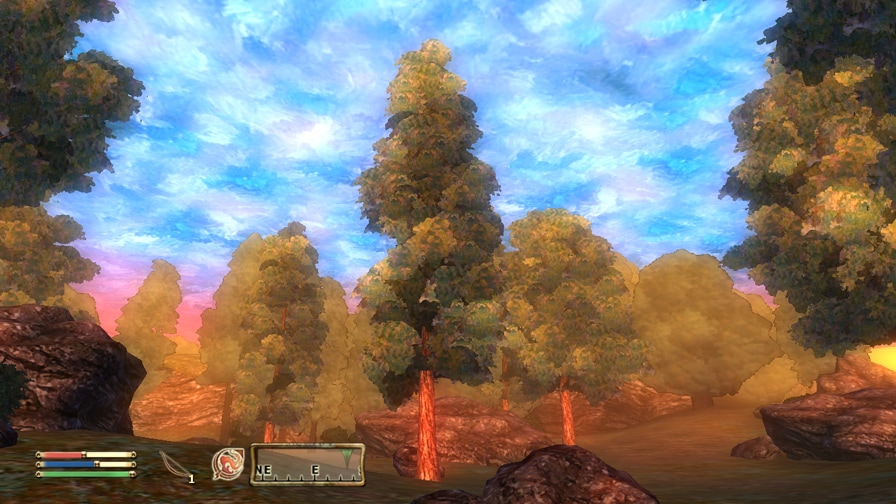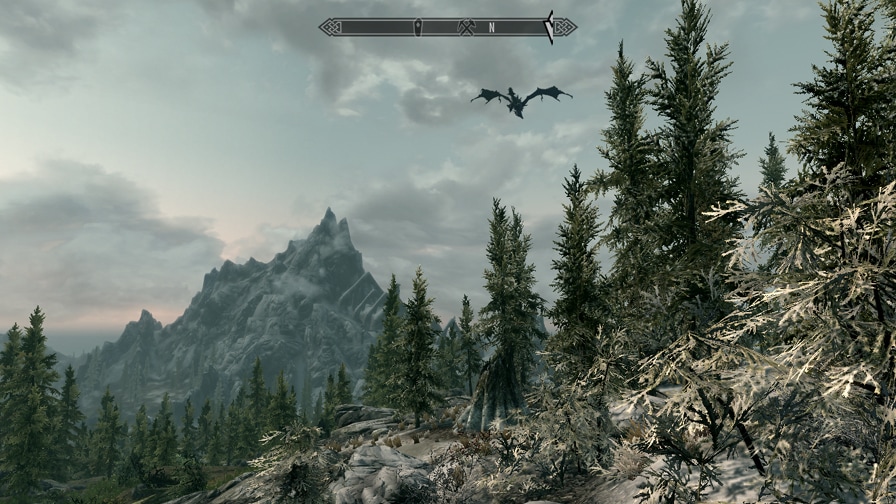I enjoyed the music and lore, in addition to a few of the design aspects, but I found the overall experience to be a bit off-putting. The graphics weren't quite as good as I was expecting for the port of an award-winning PC game. Also, the mechanics left something to be desired, and I found the menus and quest system to be pretty confusing. It didn't take long for frustration to set in. After that, I felt very little motivation to play it. In short, I was pretty disappointed with my purchase.
I was almost ready to write the series off when I began to hear information about the next installment, Oblivion, that was due out soon on the Xbox 360. I happened to watch some development videos that had been included on an Official Xbox Magazine demo disc. The improvements they had made since Morrowind, as well as some of the new features they were adding to the game, actually looked pretty incredible.
When the game was released and I saw all the high review scores it was receiving, I started to consider giving the Elder Scrolls another shot. I couldn't forget how burned I had felt by Morrowind, though; and I wasn't keen on the thought of throwing away more money. So, I decided to give it a rental first, just to be sure.
As in other Elder Scrolls games, you start off as a nameless prisoner. During the introductory section of the game, you are prompted to select your character's race, sex, features, skills, and attributes. Then you are on your way. The game opens in the dungeons of the capital city of Cyrodiil. The emperor, voiced by Stewart, is attempting to flee from assassins. As fate would have it, his secret escape route into the catacombs goes right through your prison cell. He stops to comment on your fateful role in the unfolding events and grants you a pardon before heading on his way.
After completing a brief tutorial section, you happen upon him again in the catacombs. Sensing that that the hour of his demise is likely at hand, he entrusts you with the Amulet of Kings, a powerful artifact that could decide the fate of the land. He asks you to take it to his sole remaining heir, whose existence and location are a closely guarded secret. Shortly thereafter, one of the assassins murders him. You dispatch his killer, head through the sewers, and then make your way out into the world, where your journey begins.
While the majority of those improvements can be attributed to the much better hardware that Oblivion runs on, even aspects like the plot, which were totally independent of that, were just better. For instance, the opening of Oblivion is much more exciting and dramatic. Whereas in Morrowind, you step off of a ship and are asked to fill out paperwork, in Oblivion, immediately out of the gate, you are thrust into the middle of an imperial assassination plot and tasked with saving the entire realm.
The graphics in Oblivion are probably the single biggest advancement since Morrowind. The level of detail, the scenery, the draw distance, the color palette, all of it just looks absolutely amazing. The graphics in Morrowind were serviceable (on Xbox, anyway), but the scenery was actually somewhat bland and featureless. Most of the time everything looked flat, sparse, muddy and foggy. Also, the draw distance left something to be desired.
When I exited the sewers and entered the world of Oblivion for the first time, I was blown away by what I saw. The colors, the detail, the realism of it all was simply staggering. I turned the view upward and saw the most beautiful dusk sky I had ever seen in a video game. There were oranges and purples, clouds, and tiny little stars popping out one by one. I turned all the way around and saw miles of lush, tree-covered hills, water, individual blades of grass, and some stone structures, all surrounding me in incredible detail.
Also, the draw distance in Oblivion was just pure insanity! Up to that point, I was used to not being able to see the equivalent of about 75 - 100 yards in most games. Morrowind was no exception. One of the first things I did in the overworld was to make my way up a nearby mountain.
After dispatching a few wolves and bandits, and meeting a traveler or two, I came to an overlook. I strolled over to check out the view was awe-struck by what I saw. The valley below seemed to stretch on forever. I could see for miles even beyond that, almost clear across the entire kingdom. It was just like real life! For a split second, I think I even forgot I was playing a game. It felt like I was really standing there on that mountain, looking down at the world spread out before me.
After a short walk, I came across a man who appeared to be down on his luck. I stopped to talk to him and he told me about a nearby witch who had stolen all of his possessions. He asked me to help him deal with her so he could get his stuff back. "Sweet!", I thought. "I'll get to take down a witch and complete my first quest!"
I must have accidentally skipped the part when he told me where to find her because I couldn't for the life of me figure it out. I tried speaking with him again and he wouldn't give me any more information. I checked all the menus and the quest journal for any kind of clue but there was nothing to be found. I then proceeded to spend the next 40 minutes scouring the surrounding area trying to find this supposed nearby witch but I ultimately couldn't find any trace of her. To make matters worse, the guy kept dying every time a stupid animal or monster attacked us.
I really wanted to see the quest through but I started to get pretty fed up with the situation. It wasn't much fun constantly having to reload my saves to keep the guy alive and searching all over that god-forsaken ugly landscape without any luck finding what I was looking for. Finally I had had enough and I just let him die. I tried to move on with the game but after the extremely boring introduction and my horrible first quest experience, I quickly lost interest and stopped playing altogether.
By contrast, in Oblivion, every quest has a page explicitly detailing what needs to be done in order to complete it. Furthermore, there is a very handy marker that appears on the map showing you exactly where to go. Any time I got even remotely lost or confused I just pulled up the quest journal, reread the entry for that particular task, and checked the corresponding map marker to see where I needed to go next. Whereas in Morrowind I was just totally lost and confused, in Oblivion I was an unstoppable quest completing machine. No frustrations of any kind.
Giving every character a voice really made Oblivion a much more realistic and immersive game. The only real drawback was that Bethesda didn't quite hire enough voice actors to offer sufficient variety for thousands of characters. Not that they needed to bring in an army of talent, but the world does slowly start to become less believable the more you realize everyone it it sounds like the same six or seven people. Despite that minor criticism, the voices being in the game are still much better than not having them at all.
Of course, the music was hands down the best part of either Morrowind or Oblivion. I think it is fair to say that Jeremy Soule is one of the most talented video game composers of our time. His work on Morrowind was exceptional; and with Oblivion, even more so. The score is beautiful, haunting, foreboding, and varied. It is a joy to listen to and it fits the gameplay perfectly. I enjoyed it so much that I even purchased the digital soundtrack online. It's actually one of the better ones I've listened to, video game or otherwise.
I still can't fully wrap my head around the incredible wealth of content Oblivion provides. The base game itself was enormous, but then Bethesda decided to add some pretty substantial downloadable content on top of that. There are those who may remember the infamous "horse armor" fiasco and still get a sour taste in their mouths. Personally, I prefer to think about Knights of the Nine, the Shivering Isles, Thieves Den, and the other great additions. For the one piece of content they got wrong, they had quite a lot of others that they definitely got right. With so much to do and see, Oblivion never really got old for me. I still play it today from time to time. In fact, the only real reason I don't play it as much as I used to is because it has since been (mostly) supplanted by its even better sequel, The Elder Scrolls V: Skyrim.
Skyrim has its own advantages over Oblivion and is a better all-around game as a result. Despite being clearly superior though, none of the improvements made from Oblivion to Skyrim were even remotely as substantial or numerous as those made from Morrowind to Oblivion. That is why no other game in the Elder Scrolls series, or the adventure/RPG genre in general, had as big an impact on me as The Elder Scrolls IV: Oblivion. In so many ways, it truly was a game changer.

